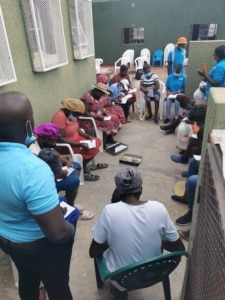Namibia is classified as a middle-income country. However, socio-economic inequalities inherited from the years under apartheid persist. In informal settlements, access to education, health, social services, transport, and other public services is extremely limited. Insecurity, gender-based violence, unemployment or lack of capital to develop economic projects are major concerns, and development activities remain rare.
As in many countries where FXB International is pursuing its mission to bring about sustainable change to eradicate extreme poverty and promote social justice, we launched a pilot economic and community development FXBVillage program in April 2018. Conducted in partnership with HISA in a slum near Windhoek: the Tobias Hainyeko constituency within the Kilimanjaro community, this project aimed to lead 100 families on a path to economic and social self-sufficiency in three years. A complementary project, aimed at curbing gender-based violence and protecting women and children, was launched in 2020.
Sacha’s mission focused on closing the pilot program, welcoming new participants to the second VillageFXB program, and monitoring the gender-based violence reduction program.
FXBVillage programs : Acknowledging graduation of previous participants and welcoming newly selected households
On February 10, former and new participants gathered at the HISA community center to celebrate the graduation of the 100 families who have moved from their miserable conditions to a more dignified life in three years. The final evaluation showed a significant positive impact on the lives and economic, educational, health, and social status of the 525 children and adults who have been accompanied for three years. Testimonials from participants, speeches, and traditional dances were part of the ceremony.
As these 100 families graduated from the program, FXB and HISA welcomed 100 new households as we secured a new round of funding to continue implementing the VillageFXB poverty reduction model. Lessons learned from the pilot program were used to further adapt the intervention to the local context, including income-generating activities, access to education for children, and beneficiary group dynamics.
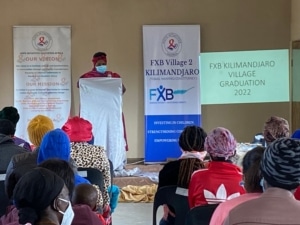
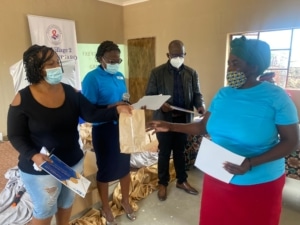
An important feature of the FXBVillage model are the beneficiary groups. Participants are gathered into groups of 20 to 25 members, in order to save money as a group, provide small loans and develop collective Income Generating Activities. Initial group meetings were organized during Sacha’s mission, which allowed further discussion on the next steps and the model savings and loans model to be used in beneficiary groups.
Beneficiary group meeting, recording savings in logs
GBV Project : An ongoing innovative intervention curbing the issue of Gender-Based Violence in Namibian informal settlements
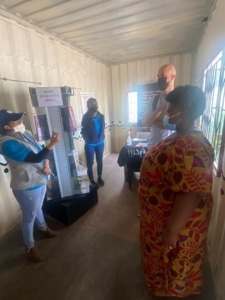
Complementing the objectives of the poverty reduction model FXBVillage, FXB and HISA contribute to the promotion and protection of women’s and children’s rights, specifically targeting Gender-Based Violence (GBV). The project, which targets 4,650 people, aims to strengthen protection and violence prevention systems in the slums, promote safety and combat gender-based violence, empower women and girls, and provide support to victims of violence.
Sacha visited and assessed the safe spaces implemented in the project areas where victims of GBV, domestic violence, and child abuse can report their situation. The project team is then able to provide first aid support to victims, refer them for further care and optimal management if needed, and monitor the situation after care has been received.
In addition, this project also aims at increasing awareness in informal settlements about violence issues, as well as engaging men and boys to act as agents of change themselves. Community walkthrough, human rights campaigns, trainings, sensitization sessions and edutainment activities are organized in order to raise community awareness and knowledge on the evil of GBV and other forms of violence.
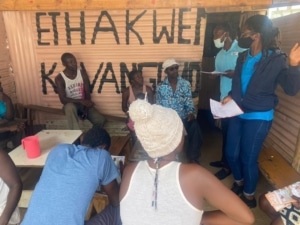
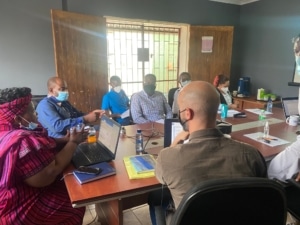
This field mission was a good opportunity to strengthen FXB’s relationship with its local partner HISA Namibia and with other project stakeholders, first and foremost the EU Delegation in the Republic of Namibia, which co-finances the program on gender-based violence and the protection of women and children.
FXB’s work in Namibia is made possible by the support and trust of its partners: the Liselotte Foundation, the European Commission and the Raja-Danièle Marcovici Foundation.
